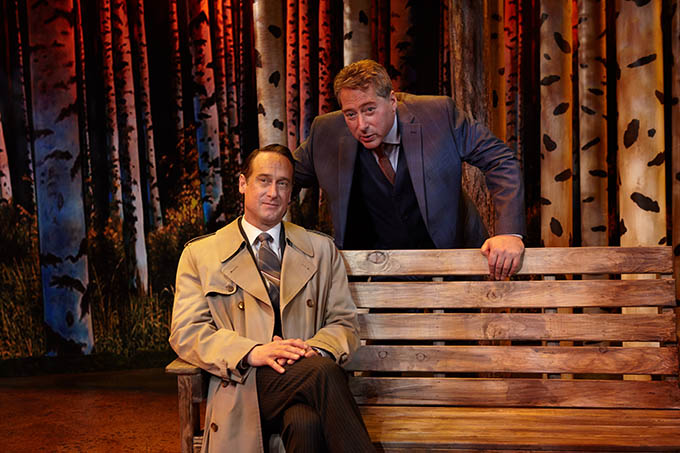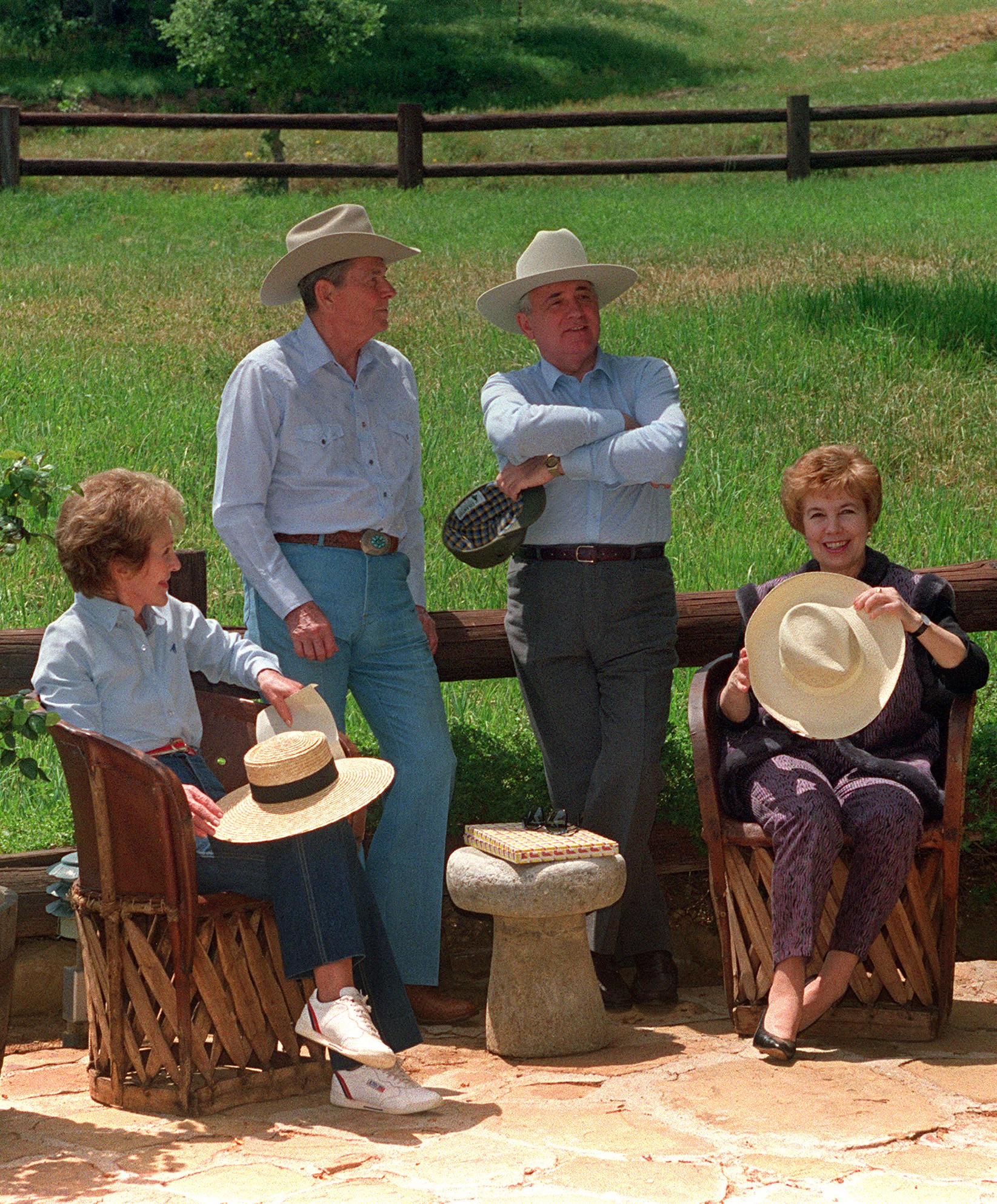Fair to middlin’ ‘Walk in the Woods’ Is a ‘Zoo Story’ for the Trump-Putin Age
On Feb. 1, President Trump confirmed that the U.S. is pulling out of the Intermediate-range Nuclear Forces (INF) treaty between the former Soviet Union and the United States, alleging that Vladimir Putin’s Russia has violated the agreement with its development of new missiles that exceed the INF range limits of between 310 and 3,400 miles.
If he’s still in office by Aug. 1, Trump plans to formally announce the withdrawal unless those dirty commies knock it the hell off.

John Honeyman (J. Todd Adams, seated) and Andrey Botvinnik (David Ellenstein) are on a fool’s errand. Photo by Aaron Rumley.
Gorbachev and his style-maven wife Raisa would visit the ranch in 1992.
For some, North Coast Repertory Theatre’s fair A Walk in the Woods may recall the treaty summit, at least the part about the men’s camaraderie. Lee Blessing’s play, directed here by Richard Baird (on the somewhat distant heels of Des McAnuff, who helmed it at La Jolla Playhouse in ‘87), is in fact suggested by a similar real-life incident. In 1982, hard-line U.S. negotiator Paul Nitze and his Soviet counterpart Yuli Kvitinsky left the official Geneva site for a quiet stroll outside the city and reached an arms breakthrough of sorts — except that this one was soon rejected by their governments, raising the possibility that the talks were all for show.
This piece speculates on the profound effect the men’s little breathers had, with veteran Soviet go-between Andrey Botvinnik glibly professing his friendship before newbie U.S. envoy John Honeyman. The latter is clearly uncomfortable in his role; even so, the 50-ish duo jockey for months on their relative positions, yielding a few biases along the way.
‘It is not always pleasing to discover what you are meant for.’
— Andrey Botvinnik
The ebullient Botvinnik likes Willie Nelson and thinks banjos rock; button-down Honeyman hates brown suits, fancies botany and icily makes it clear he’s seeking an agreement and nothing else.
There’s a lot of Edward Albee’s popular The Zoo Story here, right down to the park bench, the eccentric Jerry and the priggish Peter. Botvinnik is Blessing’s Jerry, whose brilliance and imagination mark his many incongruities; Honeyman’s wholesale mistrust is Peter’s stock in trade. Two very different men vie for their worldviews as they see them, with their outlooks on life as immutable as they themselves.
The difference here is that world peace may be at stake — even so, Botvinnik observes, “It is not always pleasing to discover what you are meant for.” The search for world peace, he concedes, is a fool’s errand amid the very public idea that the globe’s two superpowers are far more concerned with preserving status. A grudging Honeyman eventually agrees.
The play is thus as much about nuclear proliferation as about the men’s personal relationship. Amid the exchanges, guy 1 talks as good a game as guy 2, each desperately sincere in the suggestion that nuclear weapons bite gas. Back and forth the story goes, trying to determine whether the show is a proclamation of public disgust or a private meeting of two fine minds — and Blessing sits sometimes idly by, leaving his characters to volley for an answer he never supplies.

The wives flank President Ronald Reagan and Soviet Secretary General Mikhaïl Gorbachev in somewhat happier days. Public image.
Marty Burnett’s lush autumnal set plays at once to the botanist in Honeyman and to Botvinnik’s rascally side (he says the time away from the glare of the bargaining table will confuse the reporters). Elisa Benzoni’s costumes are ironical in at least one respect — for all Honeyman’s protestations on brown suits, he’s found himself wearing an almost mahogany ensemble.
The rest of the tech is fine, with Matt Novotny’s subtle lighting adaptation making all the difference in mood between the two acts.
Gorbachev, now 88, responded last fall to Trump’s stated intentions on the treaty, saying that the move is “very strange” and “not the work of a great mind.” Don was likely outraged at the observations amid his spareness of skin and the fact that he’s an effin’ idiot to begin with.
While Blessing’s play may help explain Mike’s dismay and Don’s wholesale inanity, it’s not good at defining its own purpose. You might say the typical politician isn’t either, and you’re correct — but by golly, two wrongs don’t make a right.
This review is based on the matinee performance of June 8. A Walk in the Woods runs through June 23 at North Coast Repertory Theatre, 987-D Lomas Santa Fe Drive in Solana Beach. $44-$49. northcoastrep.org, (858) 481-1055.

Martin Jones Westlin, principal at editorial consultancy Words Are Not Enough and La Jolla Village News editor emeritus, has been a theater critic and editor/writer for 25 of his 47 years…
More…


